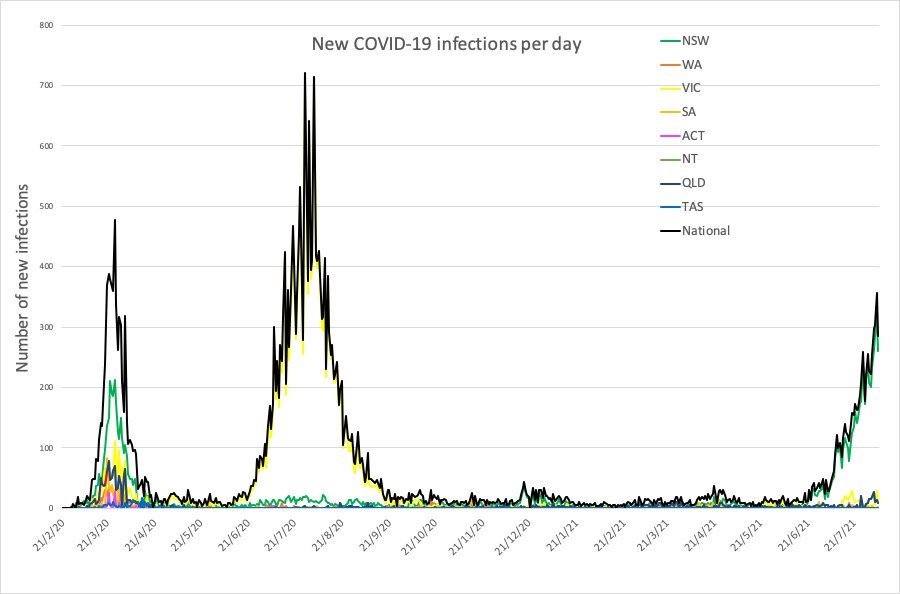And unpublished data suggests the Moderna vaccine is highly protective against severe disease and death.
Welcome to The Medical Republic’s COVID Catch-Up.
It’s the day’s covid-19 news in one convenient post. Email bianca@biancanogrady.com with any tips, comments or feedback.
9 August
- Reinfection rates are lower in the vaccinated than the unvaccinated.
- Moderna vaccine highly effective at preventing covid, severe disease and death.
- Single Pfizer dose generates higher antibodies in previously infected individuals than two doses in uninfected individuals.
- Sixth fatality from vaccine-linked clotting disorder, in a 34-year-old woman.
- Stroke hospitalisations declined by 18% in France during pandemic’s first wave.
- All aged-care workers in England required to be fully vaccinated.
- Tamworth in lockdown and Byron on alert after visits from infected travellers.
- Latest covid-19 infection numbers from around Australia.
- Got a question about covid? Ask, and ye shall receive an evidence-based answer.
Vaccination against covid provides significantly greater protection against reinfection than previous infection alone, research suggests.
A study published in Morbidity and Mortality Weekly Report examined vaccination status among 246 individuals who were initially infected in 2020 and experienced reinfection during May-June 2021. The 492 controls were individuals who were infected with SARS-CoV-2 during 2020 but did not experience a re-infection during June 2021.
Researchers found a lower rate of vaccination among those who experienced reinfection compared to those who didn’t, and calculated that the unvaccinated had 2.3 times higher odds of reinfection than those who were fully vaccinated.
“This finding supports the CDC recommendation that all eligible persons be offered COVID-19 vaccination, regardless of previous SARS-CoV-2 infection status,” the authors wrote.
The Moderna vaccine – now called ‘Spikevax’ – shows 93.2% efficacy in protecting against symptomatic covid and 100% efficacy in preventing death from covid, according to unpublished results released by the manufacturer.
The phase 3, placebo-controlled study involved just over 28,000 individuals randomised either to two doses of the mRNA vaccine given 28 days apart, or two doses of placebo.
Final analysis of the results suggested the vaccine was 93.1% effective at preventing symptomatic covid from 14 days after the second dose, and was still 9.24% effective at four months after the second dose. It was 98.2% effective at preventing severe disease.
The company announced it is also working on a booster product, based on the assumption that neutralising antibody levels will decline after six months.
A single dose of the Pfizer vaccine may achieve higher levels of neutralising antibodies in people with prior covid infection as two doses does in the infection-naïve, research suggests.
A study, published in JAMA, examined antibody levels after vaccination in 30 individuals who had previously been infected with covid, and 29 who hadn’t. This revealed that mean antibody levels in the previously infected after a single dose of the Pfizer vaccine were double those seen in the uninfected after two doses of the vaccine.
The study also showed that the second dose of vaccine did not significantly increase antibody levels in those who had previously been infected, suggesting a single dose may be enough to achieve protection.
“This study highlights the potential for recommending a single dose for previously infected individuals and may be useful for discussions surrounding vaccination strategy,” the authors wrote.
A 34-year-old woman has become the sixth fatality from the rare thrombosis-with-thrombocytopenia adverse event associated with the AstraZeneca vaccine.
According to the Therapeutic Goods Administration, the woman died after receiving her first dose of the vaccine.
The TGA noted that women appear to be more likely to experience severe TTS. Five of the six deaths from the adverse event have been in women; three under the age of 50, one 52-year-old and one 72-year-old. The only male death was in a 44-year-old.
The Australian Technical Advisory Group on Immunisation estimates the risk of TTS in those aged under 50 years is 3.4 per 100,000 doses, in those aged 50-59 it is 2.4 per 100,000 doses, and those aged 60 years or older it’s 1.7 per 100,000 doses.
Stroke hospitalisations in France dropped around 18% during the first wave of the pandemic in March-April 2020, according to a paper published in the non-peer-reviewed preprint server Medrxiv.
The population-wide study saw similar decreases in admissions across all stroke types. The greatest decreases were seen in hospitals in Paris, and in the north-east and south-east of the country, which corresponded to the spatial distribution of covid.
“The drastic lockdown measures and unprecedented epidemic context have most likely impacted the probability of patients seeking hospital assistance in France, particularly in those regions most affected by COVID-19,” the authors wrote. “The impact of the epidemic on cerebrovascular diseases may be seen in the months and years to come.”
All workers in aged care facilities in England are now required by law to be fully vaccinated against covid unless they have a medical exemption.
The law was passed by the House of Commons last month and comes into effect from 11 November 2021. It also applies to professionals visiting care homes.
Tamworth and Byron Bay are on alert after infected individuals travelled to those regions over the weekend, and Tamworth has gone into seven-day lockdown to limit potential spread.
The good news is that the stay-at-home restrictions will ease in regional Victoria from midnight tonight, as no new cases have been reported.
Here are the latest covid-19 infection numbers from around Australia to 9pm Sunday:
National – 36,330 with 936 deaths
ACT – 124 (0)
NSW – 10,917 (261)
NT – 199 (0)
QLD – 1918 (8)
SA – 868 (2)
TAS – 235 (0)
VIC – 21,010 (13)
WA – 1059 (0)

Got a question about covid? After nearly 18 months writing about this pandemic, we’ve become pretty good at finding stuff out about covid. So if you’ve got a question, ask it here, and we’ll do our best to get you an evidence-based answer.


